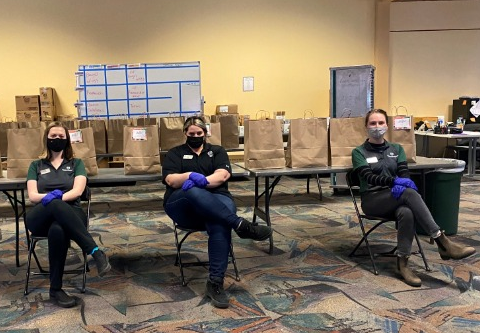When Colorado State University students living in campus housing are notified that they have tested positive for COVID-19, or may have been exposed to someone who tested positive, things move quickly. And it can be stressful, often requiring students to gather their belongings at a moment’s notice and move into a different room, where they will spend 10-14 days away from others to slow the spread of the virus.
But over the past 11 months, Housing and Dining Services staff have worked hard to make those sudden relocations as smooth as possible, and students have expressed appreciation for employees who have gone the extra mile during the quarantine/isolation process. (“Quarantine” is the term used for someone who may have been exposed (a close contact); “isolation” is used for someone who has tested positive and/or been symptomatic. Both mean having no contact with other people.)
It starts when public health staff members from the COVID Contact Team in CSU’s Environmental Health Services are notified of a positive test or possible exposure, through the COVID Reporter. They initiate the contact tracing process and notify the student that they’ll be hearing from someone in Housing and Dining Services about relocating if necessary.
About the process

John Malsam, associate director for occupancy management in HDS, handles relocations, which are ideally completed within a few hours. He identifies a vacant unit reserved for quarantine/isolation.
Students are typically sent to a secured wing of Corbett Hall with its own ventilation system, with any overflow assigned to a CSU apartment or even University Inn, as was necessary at times last fall. At one point last semester, there were about 140 students in quarantine or isolation, with the two categories housed on separate floors of Corbett.
Units used for quarantine/isolation are thoroughly cleaned by Environmental Services — one of several key partners in the process — and left empty for 48-72 hours before being used again.
“People think this is a typical 9-to-5 job,” said environmental technician Eddie Camarena. “But it goes beyond that, because when we disinfect, we’re saving people’s lives and helping people get better.”
Malsam contacts the student to outline the procedure, answer questions, talk about what to pack and find out what other needs they’ll have, from dietary restrictions to excused absences from in-person classes. He also deploys a driver to transport the student to the new temporary quarters in a specially equipped van with a plastic screen between the passenger and the driver. (One student being quarantined sent his family a Snapchat photo from the back seat, saying, “I’m in a ’rona van!”)
Malsam credits Jose Rosales of HDS Facilities with retrofitting the van.
“This wasn’t using Saran Wrap or cut-up trash bags taped to the inside of the van,” Malsam said. “This was done professionally.”

“People think this is a typical 9-to-5 job. But it goes beyond that, because when we disinfect, we’re saving people’s lives and helping people get better.”
— Environmental technician Eddie Camarena
‘Unsung heroes’
While drivers aren’t permitted to help carry the student’s belongings, they help in other ways that are perhaps more important.
“The van drivers are some of the unsung heroes in the process; they are a glue in all of this,” Malsam said, adding that drivers are often pulled from their regular job duties to transport students well into the evening. They walk the students into the building, pull extra linens or grab-and-go snacks if necessary, answer questions, disinfect the van between rides, and call in additional resources if a student seems to be struggling with the situation.
“Students have expressed a lot of gratitude at the helpfulness and positive demeanor of the drivers, which improved what could be an awkward situation,” Malsam said. “Here’s this stranger showing up at your residence hall, loading you and your stuff up, and taking off to this other strange location. But it’s more than a voice on the phone; that driver is there in person.”
Another key partner in the process is the dining services staff. Each day, between 10 a.m. and noon, they deliver meals to the front door of each room where a student is in quarantine/isolation. Each paper bag contains a full day of food: three meals, snacks and beverages. Delivery staff hang around to make sure students take the bags into their rooms, to get perishables into the fridge. Customized deliveries also are available; students can call a dedicated hotline to request anything they need.
“I had one student who just flat-out said, ‘No vegetables — none,’” Malsam said with a laugh. “And our dining team figured it out. They have been really responsive to students, whether that’s someone who wants more food, less food, or accommodations for special dietary needs, allergies, intolerances or just preferences.”

Members of the CSU catering team deliver three meals, snacks and drinks to students who are in quarantine or isolation. There are also pantries from which students can request food after normal delivery hours. From left are Ally Gould, Vita Prentiss and Rebecca Graese.
Special requests
Patrick St. Clair, HDS assistant director of support services, said some parents have called to request their child’s preferred meals. One time, a staffer went to the grocery store to pick up some Campbell’s tomato soup, since that was a student’s favorite.
St. Clair said Dining Services Manager Vita Prentiss is overseeing the catering team that’s coordinating with the CSU Bakery to prepare each student’s meals based on a master spreadsheet, and Prentiss has gotten positive feedback.
“She’s been able to customize some meals for students, and even ran out to get oat milk for someone,” St. Clair said. “She’s been pleased to get some messages of thanks.”
Prentiss is assisted by two student managers: Rebecca Graese and Ally Gould.
Corbett and other housing spaces used for quarantine/isolation have been equipped with pantries stocked with a limited number of foods and beverages commonly requested by students, in addition to cutlery and bottles of water. Students who check into their new room after the day’s food bags have been distributed — or students who are just in need of some extra sustenance — can request items from those pantries to be delivered by Prentiss’ staff.
St. Clair said the Residential Dining Services team served 14,000 meals to students in quarantine/isolation last semester, but has seen a significant reduction in service needs so far this year.
Hi Vita,
Finally out of quarantine! Thanks for your assistance, it made it much easier for me. Thank you again for all your help and kindness. I hope the goodness you put out comes back around to you soon.
The little things
Malsam said little things like good food can make a difference when a student is having to isolate.
“If a student opens up that meal, and it’s something they like, and it’s substantial enough to meet their needs, that helps,” he said. “That student feels better about the situation they’re in, instead of feeling like they’ve been shoved away and left on their own with a minimal level of service.”
He added that some students who had been in quarantine/isolation opted to stay on campus for some or all of fall break because they didn’t want to risk exposing loved ones at home.
“We had a lot of students who specifically said they didn’t want to take the chance of going home and potentially causing someone to be ill,” Malsam said. “Some said, ‘No, my grandma lives with us,’ or, ‘I have a sibling who is immune-compromised, and I don’t want to take that chance.’ It was great to see and hear students taking it seriously, and I hope that continues this semester.”
Malsam added that students have been understanding, flexible and responsible throughout the process.
“Most of the students have been incredibly cooperative, and in a lot of cases appreciative, which is nice,” Malsam said. “They want to get through this experience, which can be a nuisance, but they do so for their own benefit, for their roommates, their neighbors and the campus community. It has been really encouraging, even in some of those troubling moments, to see that folks are ready to do their part. There’s been a genuine effort on our part to provide a high level of service at all points along the way, and I think it’s made a big difference.”

Patrick St. Clair, HDS assistant director of support services, said some parents have called to request their child’s preferred meals. One time, a staffer went to the grocery store to pick up some Campbell’s tomato soup, since that was a student’s favorite.
‘I felt at home’
Kenady Leighton, a first-year student living in Parmelee Hall who experienced temporary quarantine housing in Corbett Hall, has been thankful for the care provided by the quarantine team.
“I appreciated the staff going out of their way to help us,” Leighton said. “It’s a really hard job that I know they never expected to be doing, so I made sure they knew that I was really appreciative.”
She agreed that living in a temporary space, out of your comfort zone, can be scary.
“One of the things that made me stay positive through it all was the staff who touched base with me every day and made sure that I felt at home even though I wasn’t at home,” Leighton said. “My interaction with staff was amazing — it was the best I could ever ask for.”
Leighton said Malsam made a difference for her.
“John really helped me a lot and was my main contact,” she said. “He was always available and made sure I had everything I needed.”
Sylvia Cranmer contributed to this article.
Forever Stalwart: Rising Above the Pandemic
This article is part of the “Forever Stalwart: Rising Above the Pandemic” series, telling the inside stories of how the CSU Ramily has rallied its brilliant minds, great hearts, creativity and collaborative spirit to continue its land-grant mission and overcome the challenges of COVID-19 with innovation and resilience.
